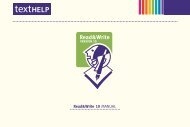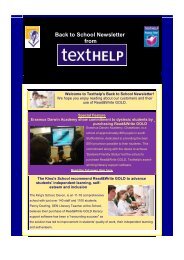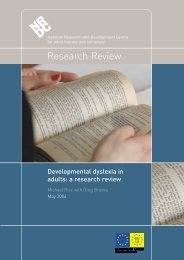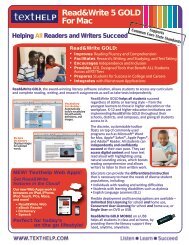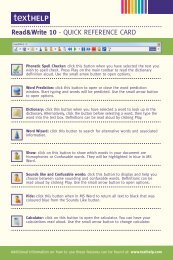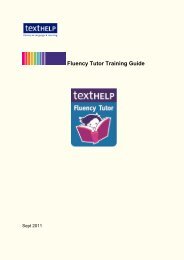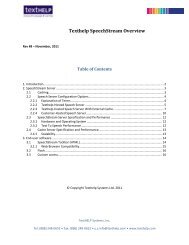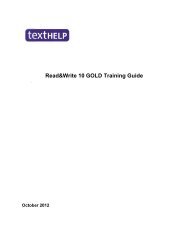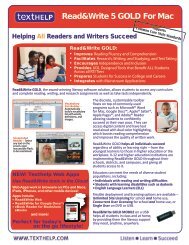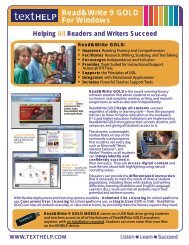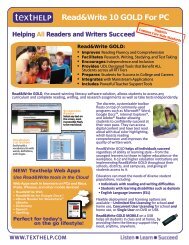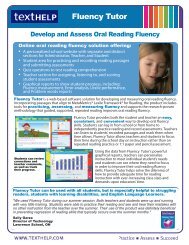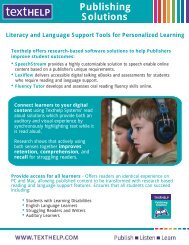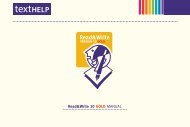Research Summary Supporting the Use of Read&Write ... - Texthelp
Research Summary Supporting the Use of Read&Write ... - Texthelp
Research Summary Supporting the Use of Read&Write ... - Texthelp
Create successful ePaper yourself
Turn your PDF publications into a flip-book with our unique Google optimized e-Paper software.
<strong>Research</strong> <strong>Summary</strong> <strong>Supporting</strong> <strong>the</strong> <strong>Use</strong> <strong>of</strong> Read&<strong>Write</strong>/Read&<strong>Write</strong> GOLD<br />
June 2008<br />
Ongoing <strong>Research</strong> Projects with RWG<br />
Project SMART (University <strong>of</strong> Kentucky)<br />
A two-year federally-funded research project that was begun Oct. 2007 to conduct scientifically-based research to study <strong>the</strong><br />
feasibility and usability <strong>of</strong> a combination <strong>of</strong> technologies (Read&<strong>Write</strong> GOLD and MathPlayer) to provide students with<br />
disabilities unprecedented access to math content at higher grade levels. Co-Project Directors are Dr. Debra Bauder (University <strong>of</strong><br />
Louisville) and Mr. Preston Lewis (University <strong>of</strong> Kentucky). Partners on <strong>the</strong> study are The University <strong>of</strong> Louisville; Bluegrass<br />
Technology Center; Tex<strong>the</strong>lp Systems, Design Science, Inc., and Prentice Hall (Pearson).<br />
eMINTS Missouri UDL Pilot Project (2006 -2007)<br />
Following <strong>the</strong> tenants <strong>of</strong> UDL, this pilot examines <strong>the</strong> use <strong>of</strong> Text to Speech (Read&<strong>Write</strong> GOLD) and Voice Recognition s<strong>of</strong>tware<br />
in eMINTS general education classrooms to support student learning needs and determine <strong>the</strong> effectiveness <strong>of</strong> <strong>the</strong>se tools for ALL<br />
students, not just those with special needs. It also investigates <strong>the</strong> potential <strong>of</strong> <strong>the</strong> s<strong>of</strong>tware for use in response to intervention (RTI)<br />
general education classrooms as an accommodation and/or intervention. The study involved Grades 3 through 5 with a homogeneous<br />
mix <strong>of</strong> students, including struggling emergent readers, English language learners (ELL), and students struggling with writing and<br />
editing skills. Teacher‟s reported significant improvement in student writing and editing skills; reading material on <strong>the</strong> Web; and<br />
engagement with learning. Positive student results were reported with ELL students in command <strong>of</strong> <strong>the</strong>ir reading and writing;<br />
emergent and struggling readers were empowered with tools that allowed <strong>the</strong>m to direct <strong>the</strong>ir own learning.<br />
Teacher Comments:<br />
• Student Benefits<br />
− “As we have researched several projects throughout <strong>the</strong> year, <strong>the</strong> option to listen to material that is above low readers'<br />
abilities has been a major plus to <strong>the</strong>ir projects' material.”<br />
− “As we work on our last big project for <strong>the</strong> year, I am, once again, glad to have RWG for my students. We are creating<br />
Missouri scrapbooks, and my students have many things to look up on websites about Missouri. They, <strong>of</strong> course, use RWG<br />
whenever necessary. They also can reread/pro<strong>of</strong>read <strong>the</strong> articles <strong>the</strong>y have written for <strong>the</strong>ir scrapbooks, using RWG.”<br />
• Improved Student‟s Writing and Self-editing<br />
− “I made a requirement that everybody had to listen to <strong>the</strong>ir writing.”<br />
− “Mine were a surprise because <strong>the</strong>y never want to do a second draft; <strong>the</strong>y never want to edit because it‟s perfect <strong>the</strong> first<br />
time, and <strong>the</strong>y would get it back and <strong>the</strong>y‟re like, „It isn‟t reading it right, <strong>the</strong>re‟s something wrong here!‟ because <strong>the</strong>y were<br />
leaving out little words or no punctuation and all <strong>of</strong> a sudden <strong>the</strong> s<strong>of</strong>tware was incorrect, but I think <strong>the</strong>y got an awakening.”<br />
− “We expanded <strong>the</strong>ir writing. The kids who didn‟t want to write, wanted to write more so <strong>the</strong>y could listen because <strong>the</strong>y<br />
wanted to spend more time listening to it than <strong>the</strong>y did . . . so <strong>the</strong>re was a pay <strong>of</strong>f <strong>the</strong>re. You know, if I only get to listen to it for<br />
three sentences that wasn‟t worth it; so I found <strong>the</strong>y worked more.”<br />
• Kept Students on Task<br />
− “Even some <strong>of</strong> our students that we really had to work with. . . <strong>the</strong>y were on task and focused. That is <strong>the</strong> best element. I<br />
mean, once those headphones go on its like, okay I know what I‟m going to do. So that was a wonderful side benefit <strong>of</strong> it for<br />
sure.”<br />
• Helped with <strong>Research</strong><br />
− “I think one <strong>of</strong> <strong>the</strong> biggest successes was just <strong>the</strong> ability to read <strong>the</strong> WebQuest when <strong>the</strong> kids are doing research.”<br />
− “All <strong>the</strong> students have benefited from <strong>the</strong> use <strong>of</strong> <strong>the</strong> program with <strong>the</strong>ir writing. It is a part <strong>of</strong> <strong>the</strong> writing and editing<br />
process for <strong>the</strong>m to use <strong>the</strong> text to speech portion. This process has become second nature for all students and <strong>the</strong>y enjoy this<br />
portion <strong>the</strong> most.”<br />
− “I love having <strong>the</strong> ability to have my students pro<strong>of</strong>read <strong>the</strong>ir work on RWG. We started back in October with our<br />
autobiographies and every writing activity since, <strong>the</strong> kiddos know to RWG <strong>the</strong>ir work before we conference or <strong>the</strong>y publish. This<br />
is a wonderful feature!”<br />
• ELL Students Benefitted<br />
– “I noticed <strong>the</strong> greatest change in ELL students who could hear <strong>the</strong> changes and <strong>the</strong> correct pronunciation <strong>of</strong> things; I think<br />
<strong>the</strong>ir writing improved. Some <strong>of</strong> our most challenging ELL students were really able to improve on <strong>the</strong>ir writing styles. …I mean<br />
<strong>the</strong>y just picked up … <strong>the</strong>y picked up on it so easily in class, and <strong>the</strong>y learned to adjust to <strong>the</strong>ir own learning style.”<br />
Page 4



